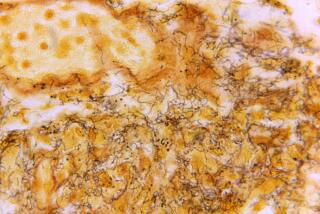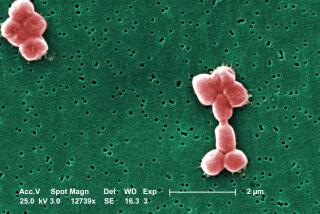Harmless viruses may provide cure for acne
Good news, pimple poppers: The solution to your acne problem may already be all over your face. A new study has found that a specific group of benign viruses that live alongside zit-causing bacteria have the power to stop acne before it starts.
The bacterium Propionibacterium acnes generally causes acne, which lives inside skin pores. When people hit puberty, an increase in hormones leads to a drastic increase in P. acnes, which in turn causes an inflammatory response on the skin. Suddenly, you’ve got pimples.
For some, though, the condition can be more than a temporary annoyance -- it can lead to scarring and bleeding.
Because acne is caused by a bacterium, current treatments focus on the use of antibiotics. But, as with all such treatments, strains of the bacterium have developed that are resistant to the drugs.
That’s where the viruses come in. Specifically, bacteriophages -- viruses that live to infect and kill bacteria, but are harmless to human cells.
In the new study, researchers at UCLA and the University of Pittsburgh isolated, sequenced and examined the genomes of 11 bacteriophages that are known to infect and kill the acne bacterium, and studied the manner in which they do it.
The biggest surprise? The bacteriophages’ DNA was shockingly consistent across all 11 organisms. Past studies of other bacteriophage populations have found that members of the same phage group -- meaning they kill the same bacterium -- have very different DNA, infecting and destroying their host bacterium in different ways. But the acne bacteriophages, for whatever reason, lack that genetic diversity.
This genetic consistency proved to be a huge plus because it simplified the researchers’ task of determining which phages infect which strains of the acne bacterium. It also helped them figure out which parts of the phage DNA were responsible for killing P. acnes.
What’s more, one of the most conserved parts of the phage’s DNA -- present in more than 95% of known acne bacteriophages -- codes for an enzyme, called endolysin, which is a well-known bacterial killer.
This suggests, the authors write, that purified endolysin applied directly to the skin might be our best shot at getting rid of acne once and for all.
The results were reported Monday in the journal mBio.
Return to the Science Now blog.






